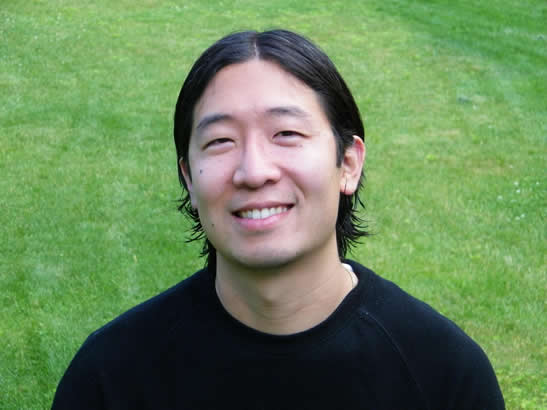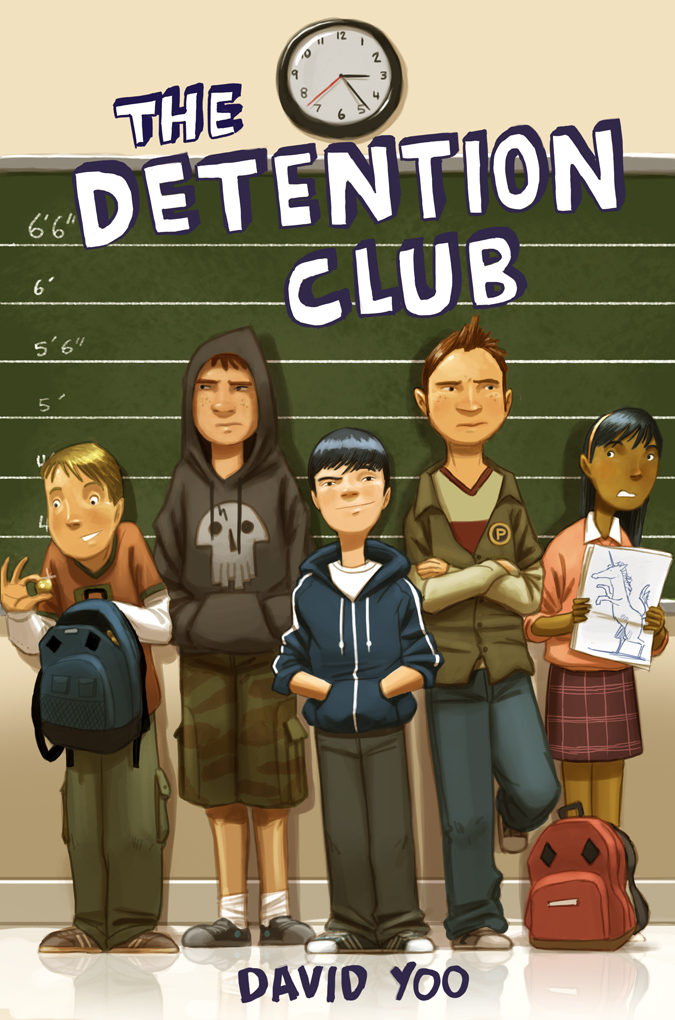
Today, I'm thrilled to bring you an author interview with the very funny, David Yoo, provided by the Teen Scene blog tour for the Detention Club. David is a graduate from Skidmore College with an MA from the University of Colorado-Boulder. His previous YA novels,
Girls For Breakfast, and
Stop Me If You've Heard This One Before both have been featured on numerous best and favorite lists. His debut middle grade novel,
The Detention Club (Balzer + Bray) was released this June and now available in bookstores and libraries. David lives in Massachusetts, where he regularly plays adult soccer
and old school video games. He also teaches in the MFA program at Pine Manor College and at the Gotham Writers’ Workshop. Please help me welcome David to my blog!
 Welcome and thank you so much for stopping by my blog. I couldn't help but think of John Hughe's "Breakfast Club" when I read the title of your book. Is that a coincidence or did the movie inspire you in any way?
Welcome and thank you so much for stopping by my blog. I couldn't help but think of John Hughe's "Breakfast Club" when I read the title of your book. Is that a coincidence or did the movie inspire you in any way? I actually didn’t connect the dots until after I’d started writing it—which is surprising given that I grew up watching and re-watching the Hughes ouvre. Now that I think about it, my first novel was called Girls for Breakfast--maybe I’ve been thinking subconsciously of the movie for years…
I'm a huge John Hughes fan as well. I grew up with his movies. If you could be any character from a John Hughes movie, who would it be and why?
I’d be Bryce from Sixteen Candles, because he and his brother Cliff had night-vision goggles, which is on a long list of things I’d probably enjoy having but will never come remotely close to owning.
*Laughs out loud* Nice pick! After finishing Detention Club, I can totally understand why you picked Bryce. Peter and Drew were popular in fifth grade because of their collecting skills. Do you have a collection of any kind?
I just looked around the house and was kind of stunned to find that I’m not much of a collector these days. It’s surprising because I’m the very definition of a pack-rat. I can’t for the life of me throw out dead tennis balls, broken watches, dried out pens…technically I have a ridiculously large dried-out-pen collection…
Which makes sense, since you are a writer. I probably have a cup of those too. Mainly because I'm too lazy to figure out which ones are dried and which aren't. How would you describe your junior high self? Would you be friends with Peter?
I was really shy around adults and older kids and a little hyper around my peers. I’d probably have a love/hate relationship with Peter.
 Interesting..I had a love/hate relationship with Peter too. Well, not really hate, but he did really irritate me at times. I love how your characters move beyond the "I am Asian" stereotype. Their race is just another part of them and they seem to be comfortable with that. However, I've noticed many books featuring Asian characters seem to perpetuate the model minority stereotype or the common immigrant stereotype. How can we breakthrough these stereotypes in literature?
Interesting..I had a love/hate relationship with Peter too. Well, not really hate, but he did really irritate me at times. I love how your characters move beyond the "I am Asian" stereotype. Their race is just another part of them and they seem to be comfortable with that. However, I've noticed many books featuring Asian characters seem to perpetuate the model minority stereotype or the common immigrant stereotype. How can we breakthrough these stereotypes in literature? Well, The Detention Club isn’t about race, and I try to avoid like the plague broaching/inserting “issues” into my stories merely for the sake of having them in there. Race, as with any other issue, only belongs in a piece of fiction if it’s absolutely crucial to the story, and that just wasn’t the case, this time around. As for perpetuating the model minority stereotype—I think what’s more important is whether or not an honest story is being told. But I know what you mean—you don’t want the model minority or immigrant stereotype story to become the only story that can be told about Asian characters—in effect pigeonholing future stories starring AA characters.
On that topic, my first collection of essays for adults that comes out next spring, The Choke Artist: Confessions of a Chronic Underachiever (Grand Central) is, as you can surmise from the title, about how growing up I was pretty much the complete opposite of the model minority. Ultimately, I think the way to break through stereotypes is simply to have as much a variety of offerings out there, presenting a wider-range portrait of the Asian American experience.
I'm excited to read your collection of essay and was in fact going to ask you about that. So thank you, for giving us more details. On that note, what are your thoughts about whitewashing book covers such as the Silver Phoenix series by Cindy Pon?
I’m not familiar with the cover, but I definitely used to cringe at decidedly “Asian-y” covers (I’ve hardened over the years I guess). The way it exoticizes the Asian American experience with those kinds of covers and basically promotes stereotypes is no different from describing people from the deep South as if they all have no teeth and wear tank tops and have cousins named Cletus. You can still spot Asian American-penned books from a mile away in the bookstore—the cover gives them away almost every time: the bambooish font, the “jet black” hair, NBA player Marcus Camby’s exotic Chinese characters tattoo embossed across the bottom, etc…
Yep or the summary of the story featuring a immigrant who desires to do something but his/her parent is very against it but the teen protagonist sneaks away and follows their "dreams" anyway. Your books are completely different. They are hiliarous and deal with the common issues of coming age. It's very hard to write humorous scenes without them being forced. What's your secret?
I try not to intentionally “write funny.” Doing so only results in painfully unfunny sentences that nakedly feel like the author’s trying too hard. I don’t have a secret, though. It goes back to that old saying I guess—tragedy plus time equals comedy. As an adult looking back on my youth, the distance allows me to find the humor in a situation I would have found mortifying/frustrating/sad when I was a kid.
I definitely had moments where I shook my head in retrospect and thought, "What the heck was I thinking?" Have you done anything in extreme like Peter in hopes of becoming popular when you were a kid?
I once shaved lines into the sides of my head because that’s what the older soccer guys were doing, only I shaved vertical lines instead of horizontal lines and it looked ridiculous.
*Laughs loudly* Sorry but I'd love to see a picture of that! You had great success writing for YA, what made you decide to write for MG? Did you find yourself changing your writing style or approach while writing Detention Club?
I like reading MG as much as YA, and most of my favorites from childhood were MG, so it was always something I’d wanted to try. As for changing my writing style—it was more that I had to change my mindset—getting into the head of an 11-year-old, which is at the very least a good deal less jaded than my 16-year-old narrators.
I enjoyed a lot of MG reads as well. Thank you so much for stopping by my blog, David! Readers, be sure to look for my review of Detention Club coming soon. Follow along the Detention Club book tour hosted by Teen Book Scene to find out more information. You can also learn more about David and his books by visiting his website.

 Welcome and thank you so much for stopping by my blog. I couldn't help but think of John Hughe's "Breakfast Club" when I read the title of your book. Is that a coincidence or did the movie inspire you in any way?
Welcome and thank you so much for stopping by my blog. I couldn't help but think of John Hughe's "Breakfast Club" when I read the title of your book. Is that a coincidence or did the movie inspire you in any way?












I love how he described humor! It's always apparent when someone is trying really hard to be funny and it just ends up being really awkward. Time definitely helps in the humor department, I agree it's so much easier to look back at something and find something to laugh about when at the time the situation was anything funny. Awesome interview!
Great interview! I have never seen 16 Candles or Breakfast Club, believe it or not.
I've been thinking a lot about diversity in YA lately. I like his comments and your questions about breaking Asian characters away from the model minority stereotype.